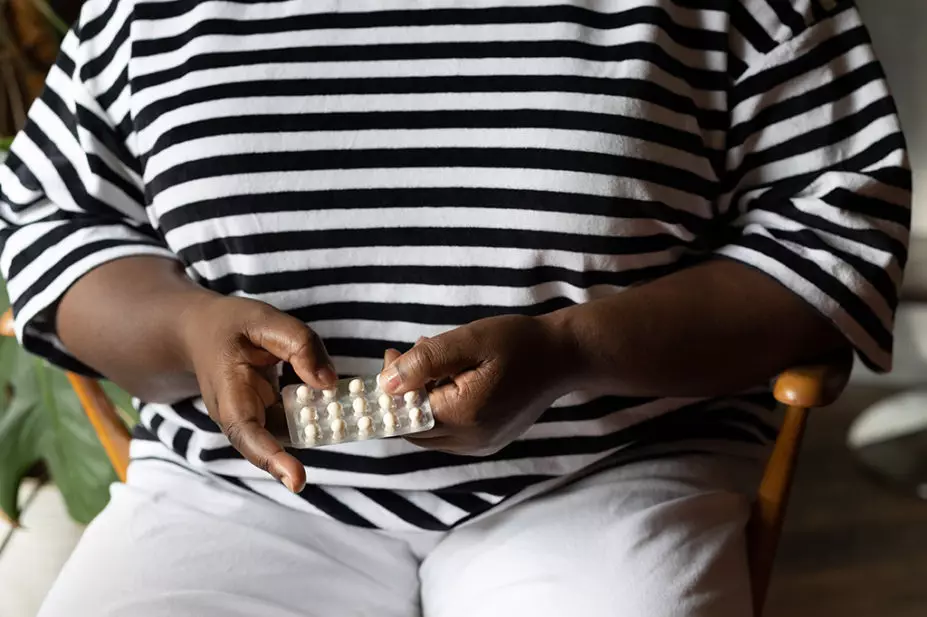
Shutterstock.com
Results from an observational study have showed there is no significant association between the use of vaginal oestrogen therapy and an increased risk of cancer recurrence or mortality in post-menopausal women with early-stage breast cancer.
However, a sub-group analysis showed that those treated with adjuvant endocrine therapy, specifically, did have an increased risk of recurrence.
The study, published in the Journal of the National Cancer Institute on 20 July 2022, included longitudinal data from a Danish cohort of post-menopausal women who had been diagnosed with early-stage invasive oestrogen receptor-positive non-metastatic breast cancer between 1997 and 2004. The women had either received no treatment or five years of adjuvant endocrine therapy.
The researchers also analysed prescription data on vaginal oestrogen therapy and oral hormone replacement therapy (HRT) from a national prescription registry and evaluated mortality and risk of recurrence associated with the use of each in this population.
Overall, of 8,461 women who had not received either vaginal oestrogen therapy or oral HRT before their breast cancer diagnosis, 6,371 were not prescribed any after their diagnosis while 1,957 (23%) were prescribed vaginal oestrogen therapy and 133 (2%) were prescribed either oral HRT alone or oral HRT and vaginal oestrogen therapy.
The adjusted relative risk of recurrence in these individuals was 1.08 (95% confidence interval [CI] 0.89-1.32) for vaginal oestrogen therapy and 1.05 (95% CI 0.62-1.78) for oral HRT.
In terms of overall mortality, the adjusted hazard ratio was 0.78 (95% CI 0.71-0.87) and 0.94 (95% CI 0.70-1.26), respectively.
In contrast, the sub-group analysis showed that in women who were receiving adjuvant aromatase inhibitors and were being treated with vaginal oestrogen therapy, the adjusted relative risk of breast cancer recurrence was 1.39 (95% CI 1.04-1.85), suggesting there was an increased risk in this group.
National Institute for Health and Care Excellence guidelines do not recommend offering HRT routinely to women with menopausal symptoms and a history of breast cancer, except in “exceptional cases”. However, the study authors concluded that their results suggested there was no evidence that vaginal oestrogen therapy or oral HRT increased risk of recurrence among patients treated with the hormone therapy tamoxifen or those who did not receive adjuvant endocrine therapy.
However, they did acknowledge that only a “small subset” of patients in the study received oral HRT, compared to those who received vaginal oestrogen therapy.
In an editorial accompanying the study, Elizabeth Cathcart-Rake, a breast oncologist at the Mayo Clinic, based in the United States, said: “These results suggest that breast cancer survivors on tamoxifen with severe genitourinary symptoms can take vaginal oestrogen therapy without experiencing an increase in their risk for breast cancer recurrence.
“However, caution is still advised when considering vaginal oestrogen for breast cancer survivors on aromatase inhibitors, or when considering menopausal hormonal therapy.”
Commenting on the results, Melanie Davies, consultant obstetrician and gynaecologist at University College London Hospitals, warned that most breast cancers are hormone sensitive and that randomised trials of HRT after breast cancer showed increased risk of recurrence.
She added: “This is an observational study and although it has the advantage of being a national cohort, Denmark is not a large country and there were only 133 women who took HRT for five years after breast cancer. Also, we don’t know if they may be a selected group of women with a good prognosis, or how long ago they had cancer. So I don’t think this is enough to change advice.”
Davies added that vaginal oestrogen was “very different” from HRT because the amount absorbed through the vagina was “very small” and less likely to have an effect on the breast.
“Vaginal oestrogen is probably safe with tamoxifen, which blocks oestrogen receptors so it might counteract the effect of any oestrogen that does get absorbed.
“However, aromatase inhibitors work differently (they reduce production of oestrogen in the body but don’t block its effects) so even using vaginal oestrogen is usually considered unwise.”
Annice Mukherjee, consultant endocrinologist at Spire Manchester Hospital, emphasised that the study included women with early-stage breast cancer who did not receive chemotherapy.
“They are therefore a highly selected group with a lower risk of recurrence than women with more advanced disease at presentation who are treated with chemotherapy,” she explained.
“The data are very reassuring for the use of vaginal oestrogen therapy and this is consistent with previous data.”
However, she said the numbers in the systemic menopausal hormone therapy group were “far too small” to make any new conclusions about the safety of this treatment.


